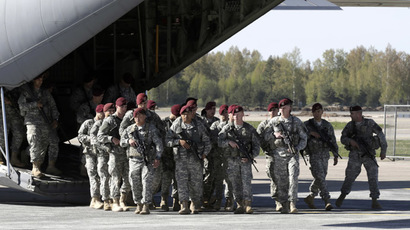Estonia wants NATO bases on its territory as military bloc plans expansion

Estonia wants permanent NATO bases on its soil, the country’s president told journalists. The military alliance plans to deploy its bases in Eastern Europe, close to Russia’s borders. The statement comes two days before the NATO summit in Wales.
Estonian President Toomas Hendrik, who is now visiting Oslo, admitted to reporters at a news conference that the Baltic state would welcome NATO deploying bases on its territory.
"We should not have NATO with two-tier countries: with NATO permanent bases and without. This is a wrong signal to send to the potential aggressor," Hendrik said.
This comes on the eve of a visit to Estonia by US President Barack Obama and two days before the 28-nation military bloc opens its summit in Wales.
NATO has repeatedly revealed its intention of deploying more military bases in Eastern Europe, specifically in the three Baltic countries - Lithuania, Estonia and Latvia - and neighboring Poland.
Last week, NATO Secretary-General Anders Fogh Rasmussen said that they would attempt to agree on “a more visible NATO presence in the East” despite internal opposition.
“Our eastern allies will be satisfied when they see what is actually in the readiness action plan," Rasmussen said in an interview with several European newspapers on August 27.
The NATO chief admitted that the alliance already has “the NATO response force, whose purpose is to be able to be deployed rapidly if needed.”
NATO planning 'rapid-deployment force' of 10,000 troops to counter Russia
The military bloc is now working to “create a fully functioning” force of 10,000 troops from seven different member states “for rapid deployment and frequent exercises.”
However, some NATO members don’t welcome the possible deployment of the military alliance’s troops in Poland and the Baltic states.
74% of Germans oppose permanent NATO bases in Poland and Baltics
74 percent of Germans oppose NATO’s eastern expansion, while only 18 percent support it.
Earlier, another two eastern European states – Slovakia and the Czech Republic – both refused to host foreign troops and military bases on their territories.
NATO’s eastern expansion would require reception facilities in host nations as well as “the pre-positioning of supplies, of equipment, preparation of infrastructure, bases, headquarters,” Rasmussen outlined.
NATO’s planned enlargement in Europe would also require additional financial investment by member-states, which not all countries are willing to support.
The alliance would like to see its member states commit to raising their defense spending to 2 percent of GDP over the next 10 years.
Canada opposes NATO budget boost - sources
Canada has already said it would not agree to increase its defense spending, according to a Reuters report that cited anonymous sources familiar with negotiations on the issue.
NATO formations on Russian borders will impact Moscow’s decision-making – envoy
Russia has warned that NATO’s progress towards eastern Ukraine will trigger a strong reaction.
"Obviously, we will take into consideration the configuration and activity of the NATO forces at the Russian borders in our military planning, and will make decisions necessary to reliably provide security and to ensure safety against any threats," Russian envoy to the alliance, Aleksandr Grushko, warned.
Moscow denies accusations of deploying more than 1,000 troops in Ukraine in order to bolster the militia in the eastern part of the country.
For now, Russia is going to review its current military policy that was adopted in 2010, deputy secretary of the Security Council, Mikhail Popov, said in an interview with RIA Novosti.














